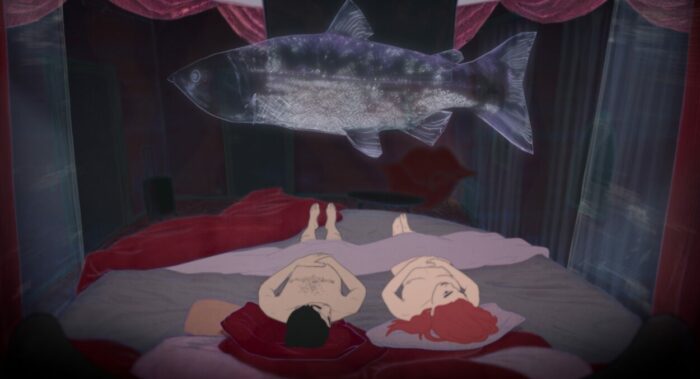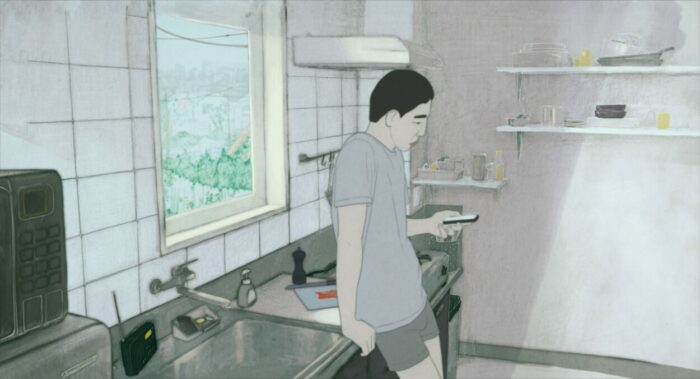With adaptations of his works having seen considerable international success (with Drive My Car becoming a surprise Oscar favorite in 2022 and Burning gaining global attention in 2018) the works of Haruki Murakami have become something of a hot property as far as cinematic translation goes. His themes of the elusive, mystical hold that people (usually women) have over us (usually men) and the pain of disappointment, disconnection, confusion and regret, have made for some especially lasting and poignant works of cinema to which this animation, a co-production between Canada, Luxembourg, Netherlands and France, hopes to aspire.
One might think that with an animation industry that flourishes like nowhere else, Japan could probably handle it’s own animated adaptations of its most renowned novelists, but Northwestern Europe actually has a semi-flourishing adult animation industry of its own, providing such alternative hits as Flee, The Breadwinner and I Lost My Hand in recent years. The animation style of Blind Willow, Sleeping Woman, is somewhat similar, with a roughness to the rotoscoped figures that develops into an awkward kind of expressiveness as the film goes on. I love animation as a format and especially love to see it used creatively to appeal to exclusively adult audiences, and although it could’ve expanded on its realist motion capture style in some places, Blind Willow, Sleeping Woman is a positive example of a film doing just that, packaging mature content and themes into the uncanny reality of animation. This allows the film to adapt the characters’ many dreams, nightmares and flights of imagination seamlessly.

The film adapts a few of Murakami’s stories—which were always intended to have an album-like cumulative effect—and massages them into an overlapping whole, taking as a common background the earthquake that struck Japan in 2011, which plants the seeds of disorder in the minds of the films three leads. Those familiar with his writing and its adaptations will be little surprised by what they find. Yes, the main character is a middle aged everyman whose mediocre life is upset when his wife suddenly deserts him, citing his emptiness in her unfeeling farewell note, leaving him to pick up the pieces of his manhood, and hopefully find her missing cat. Confused and wounded by her abandonment of him, he finds himself at a benumbed crossroads in his life, unsure where to turn as he ventures into an uncertain new beginning. So too does his wife, who reminisces on their relationship and a strange occurrence at an old job before they met. Meanwhile, his middle-aged co-worker undergoes a very different kind of crisis when a human-sized talking frog materializes in his apartment and charges him with aiding in the prevention of a second earthquake.

That last one might sound like quite the gear shift, but the animation helps here too, smoothing over the joins between dream and imagination and reality, all tying into the consistent themes of the disconnect between who people really are and how we perceive them to be. As he approaches retirement age, this man feels he’s wasted his life—it’s no coincidence I think, that he’s designed somewhat similarly to Takeshi Shimura’s unforgettable salaryman from Ikiru––is the most ‘even less than ordinary’ person imaginable, and has a harder time believing that a fantastical talking frog might have any use for him than believing such a creature exists. His dilemma is a more advanced, absurdist form of the same midlife crisis facing the film’s other two characters, as they pursue a source of desire, self-worth and contentment that has yet to take form, and very possibly never will.
As intimated, Blind Willow, Sleeping Woman recycles many of the themes and ideas that echo throughout recent Murakami screen adaptations, and even many of the same story beats like the missing cat or the cross country journey. Writer-director Pierre Foldes does an excellent job capturing the same timbre while incorporating the more comedic and absurdist elements of the gently overlapping stories. There’s a consistent tone of self-reflection and examination that could so easily feel self-indulgent if not for the vulnerability and maturity of its observations. The animation allows the film to embrace the more outlandish images and intensely psycho-sexual ones they often are. Murakami’s works are tender, ruminative, and mature yes, but they’re also just the horniest things ever, in a timid, sad, and intellectual sort of way. His protagonists long for absent women, women they fear they never truly understood or satisfied, and whose nude forms they see everywhere, in trees, clouds, mountains, even their nephew’s ears or a diagram of a shifting tectonic plate. It’s incredibly literal yet eerily obtuse, inviting the viewer to reject shallow literary interpretations and simply seek out the feeling the film’s trying to capture and suggest. Those feelings you struggle to describe through conventional means and so reach for analogies that you make up as you go and don’t really make sense, even to you, but which get you closer than anything else to describing ‘that feeling’.
Though Blind Willow, Sleeping Woman is on the face of it, one of the oddest cinematic experiences of 2023 so far, it’s also one of the most gently rewarding and strangely poignant. I find it hard to envision someone easily forgetting it and can readily imagine moments working their way into your subconscious and resurfacing many years later in the moments between sleep and wakefulness. It’s not a fully surreal, dreamlike experience, it’s too lucid and articulate in the moment to call that. But it does have that power to be truly disturbing one moment, and strangely comforting the next. There’s something charmingly, painfully relatable about the insecurity of its protagonists, their confusion, bereavement and aimlessness, and their desire to love and to be loved.




